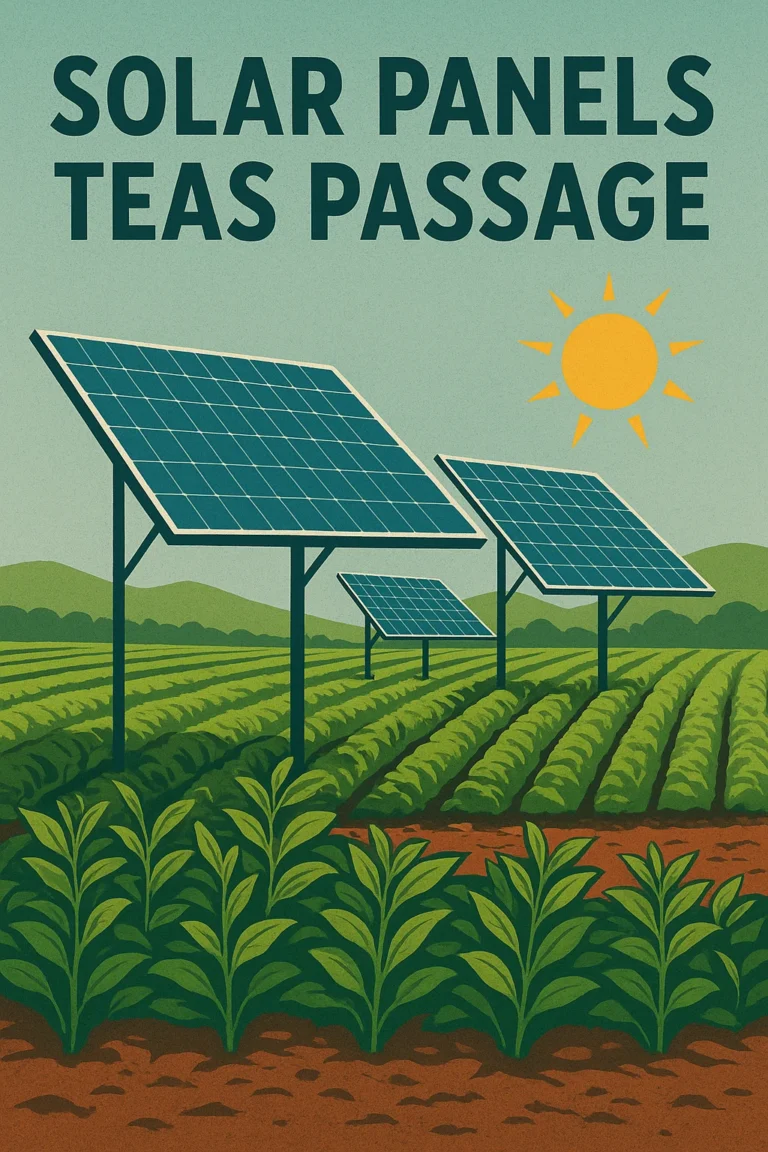Introduction to Solar Panels Teas Passage
Tea is one of the most consumed beverages in the world. Millions of people start their day with a cup of tea, and behind every sip lies the hard work of farmers who cultivate tea leaves on vast plantations. But like every agricultural sector, tea farming also faces challenges: rising energy costs, climate change, and the pressure to adopt more sustainable methods.
This is where the concept of Solar Panels Teas Passage comes in. It may sound like a new phrase, but in reality, it represents a smart and sustainable idea — using solar panels on tea plantations. This approach allows farmers to grow tea and produce clean electricity at the same time. In simple words, it’s about turning tea gardens into mini power plants, without stopping tea production.
In this article, we will explain what Solar Panels Teas Passage means, how it works, its benefits, challenges, and why it can be the future of tea farming.

Check also : Solar Panels price in Pakistan
What is Solar Panels Teas Passage?
The term “Solar Panels Teas Passage” refers to the integration of solar panels with tea plantations. Instead of using separate land for solar farms, panels are installed above or between tea plants. This method is also called agrivoltaics — agriculture + photovoltaics.
Tea farming continues as usual.
Solar panels generate electricity.
Farmers benefit from both agriculture and renewable energy.
This dual-use system is a land-efficient, eco-friendly, and profitable approach that gives tea farming a greener future.
Why Tea Farms Need Solar Panels
Tea plantations consume a lot of energy for:
Irrigation
Tea leaf processing
Storage and packaging
Transportation
Traditionally, this energy comes from fossil fuels, which are costly and harmful to the environment. By adopting solar power, tea farms can:
Reduce dependency on fossil fuels.
Cut down on operational costs.
Lower their carbon footprint.
In regions like India, Sri Lanka, Kenya, and China, where tea farming is a major industry, solar energy can be a game-changer.
Benefits of Solar Panels Teas Passage
1. Dual Land Use & Energy Efficiency
Tea farms already cover large areas of land.
Installing solar panels above tea bushes allows farmers to grow crops and produce energy at the same time.
No extra land is required.
2. Microclimate Regulation
Solar panels provide partial shading to tea plants. This helps:
Reduce heat stress on crops during hot weather.
Maintain soil moisture by lowering evaporation.
Improve plant health and yield.
3. Cost Savings and New Income Streams
Solar panels reduce electricity bills.
Extra electricity can be sold back to the grid.
Farmers can earn an additional source of income while still growing tea.
4. Environmental Sustainability
Tea farms powered by solar panels cut down carbon emissions.
Solar systems promote biodiversity under shaded areas.
It helps fight climate change and protect ecosystems.
5. Community Benefits
Local communities can get stable electricity.
Solar projects create new jobs in installation and maintenance.
Villages around tea plantations benefit from energy security.
How to Implement Solar Panels in Tea Plantations
1. Feasibility Study
Check sunlight patterns, soil type, and tea plant needs.
Estimate energy requirements for farming operations.
2. Choosing Solar Panels
Monocrystalline panels: High efficiency, suitable for limited space.
Polycrystalline panels: Affordable and good for sunny areas.
Thin-film panels: Flexible and lightweight for uneven land.
3. Panel Design and Placement
Install panels high enough to allow sunlight for tea bushes.
Use spacing patterns to balance shading and energy production.
4. Maintenance
Panels should be cleaned regularly.
Dust and pollen must be removed to avoid loss in efficiency.
5. Financing and Regulations
Look for government grants or tax incentives.
Consider partnerships with solar companies.
Check land use laws in your country.
Real-Life Examples
-
In Assam and Bengal (India), agrivoltaics are helping tea farms reduce evaporation and protect crops.
-
Tata Power installed a 1,040 kW bifacial solar system at the Chengmari Tea Estate, generating over 1.5 million units of clean energy per year.
-
In Uganda, partnerships allow farmers to outsource solar installation and maintenance, making it easier to adopt this system.
These examples show that Solar Panels Teas Passage is not just theory — it’s already happening in the real world.
Challenges in Solar Panels Teas Passage
| Challenge | Explanation | Solution |
|---|---|---|
| High initial cost | Solar systems require large investment. | Explore subsidies, shared-cost models, or Power Purchase Agreements (PPAs). |
| Design complexity | Poor placement of panels can reduce tea yields. | Work with agrivoltaic experts and conduct pilot studies. |
| Maintenance issues | Dust, rain, and weather reduce efficiency. | Regular cleaning and maintenance contracts. |
| Regulatory barriers | Land-use laws may restrict dual farming-energy use. | Engage with policymakers early. |
Future of Tea Farming with Solar Panels
The global tea industry faces pressure to become more sustainable. Consumers are more conscious about eco-friendly products, and governments are supporting renewable energy adoption.
Solar Panels Teas Passage offers:
A chance to reduce production costs.
A way to fight climate change.
A marketing advantage for tea brands that want to sell “green tea” in the truest sense.
In the coming years, more tea farms around the world will likely adopt agrivoltaics, creating a balance between tradition and innovation.
Conclusion
The idea of Solar Panels Teas Passage is more than just a catchy phrase. It’s a real, practical solution that connects tea farming with renewable energy. By combining solar power and agriculture, farmers can cut costs, protect crops, support communities, and contribute to a greener planet.
Tea has always been a symbol of comfort and tradition. Now, with the help of solar energy, it can also become a symbol of sustainability and innovation.
According to the Food and Agriculture Organization (FAO), sustainable tea farming requires innovative energy solutions like solar panels.
In short: Solar Panels Teas Passage is brewing a brighter, cleaner, and greener future for tea farming.

2 thoughts on “Solar Panels Teas Passage: A Greener Future for Tea Farming”
真免费!价值万元资源,不要一分钱,网址:https://www.53278.xyz/
益群网:终身分红,逆向推荐,不拉下线,也有钱赚!尖端资源,价值百万,一网打尽,瞬间拥有!多重收益,五五倍增,八级提成,后劲无穷!网址:1199.pw